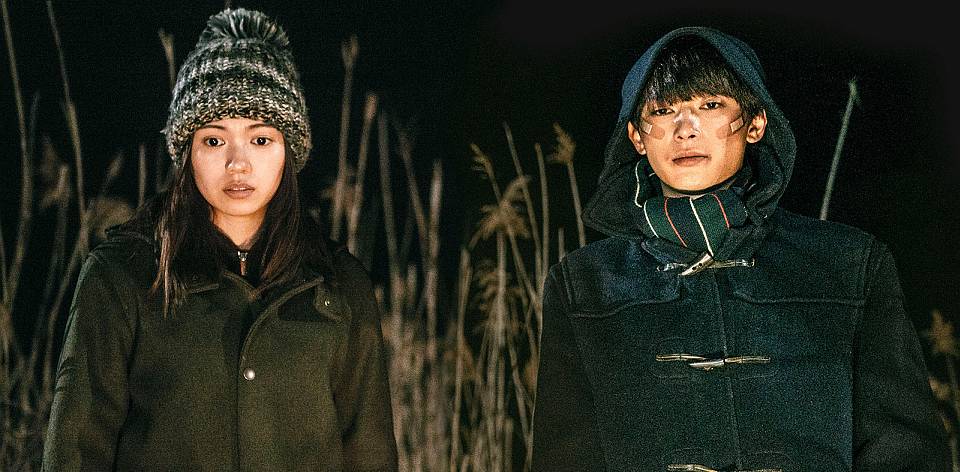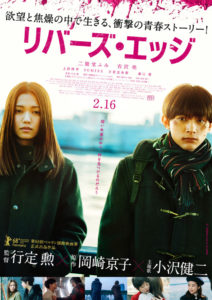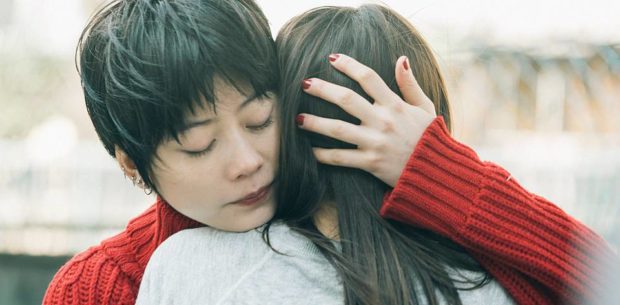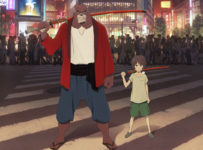High school and teen-focused dramas have been a staple of pop culture around the world, but Japanese high schools are almost iconic. Director Isao Yukisada is no stranger to teen angst. His award-winning 2001 film Go sees its protagonist go through a literal daily fight for acceptance. Last year, Narratage skirted the edges of taboo as a university student recollects her love affair with her high school teacher.
RIVER’S EDGE (リバーズ・エッジ) is different Yukisaka again, exploring a dark side to humanity that rarely pulls any punches. High schooler Haruna Wakagusa (Fumi Nikaido) sticks up for Ichiro Yamada (Ryo Yoshizawa), a gay student who is constantly bullied by Haruna’s boyfriend Kannonzaki (Shuhei Uesugi). Ichiro has his own secrets too, including the discovery of a dead body by the river that he shows Haruna.
Based on the 1993/1994 manga by Kyoko Okazaki, RIVER’S EDGE keeps the early 1990s setting right down to the 4:3 aspect ratio. Yet the film’s themes are sharply contemporary, eschewing nostalgia to tackle depression, eating disorders, bullying, sex, and suicide by the time the end credits roll. There’s probably a reason that the publicity for this film draws comparisons with Gregg Araki’s 1990s “Teen Apocalypse Trilogy.”
Disarmingly filled with explicit sex and violence, the strength of Misaki Setoyama’s script lies in the same well-rounded approach to character she brought to Japanese Girls Never Die (aka Haruko Azumi Is Missing). Haruna’s friend Rumi (Shiori Doi), for example, is introduced to us through her elicit sexual encounters with Kannonzaki. The most prominent of these involves cocaine and the insertion of a can of hairspray.
Yet she is also caught in the same cycle of inevitability that the rest of the students are stuck in. Ichiro has a fake relationship with Kanna Tajima (Aoi Morikawa), taking on his wilful cruelty and lack of interest in her for the sake of companionship. Kozue (Sumire) has been a model since she was a child, binging and purging behind closed doors. It’s no wonder they all gravitate to the death-obsessed Ichiro.
Set against nihilistic shots of the city, revelling in smoke stacks or literally out amongst the reeds, there’s no hope in Kenji Maki’s cinematography. There is a humour in the editing though, with Yukisada favouring a cheeky transition. Ichiro going down on a middle aged man, for example, is juxtaposed with Kozue almost swallowing a pizza. There’s also a series of to-camera interviews of the various subjects, adding to the whole semi-documentary feel that the aspect ratio already gives it.
To Setoyama and Yukisada’s eternal credit, they don’t take any easy escape routes. RIVER’S EDGE coalesces in a series of tragic endings for individual characters, and the utter indifference for others. As Ichiro reads Haruna the poetry of William Blake, it’s hard not to feel the crushing weight of the future that awaits these kids. After all, as the audience to their apocalypse, we have the vantage point of the future.
[stextbox id=”grey” bgcolor=”F2F2F2″ mleft=”5″ mright=”5″ image=”null”] 2018 | Japan | DIRECTOR: Isao Yukisada | WRITERS: Misaki Setoyama | CAST: Nikaido Fumi, Yoshizawa Ryo, Morikawa Aoi, Uesugi Shuhei, Sumire, Doi Shiori | DISTRIBUTOR: Kino Films (JPN), New York Asian Film Festival (US) | RUNNING TIME: 118 minutes | RELEASE DATE: 2 July 2018 (NYAFF)[/stextbox]
2018 | Japan | DIRECTOR: Isao Yukisada | WRITERS: Misaki Setoyama | CAST: Nikaido Fumi, Yoshizawa Ryo, Morikawa Aoi, Uesugi Shuhei, Sumire, Doi Shiori | DISTRIBUTOR: Kino Films (JPN), New York Asian Film Festival (US) | RUNNING TIME: 118 minutes | RELEASE DATE: 2 July 2018 (NYAFF)[/stextbox]






